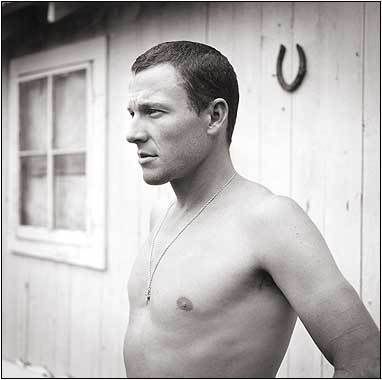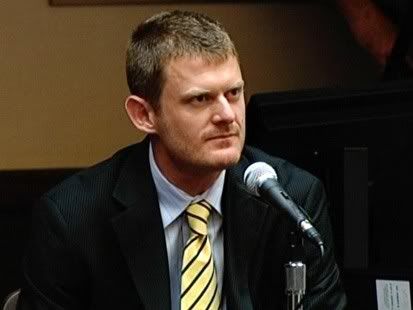BRUSSELS -- Lance Armstrong and his coach both denied several charges levied last week by former teammate Floyd Landis, including that Armstrong's Postal Service team sold bikes to fund a blood-doping program from 2002-2004.
"That's the first I've heard of that," Armstrong (pictured right) told ESPN's Rick Reilly on Sunday night in his hotel room after the second day of the Tour de France. "I honestly don't know what happens to the bikes after the race. Every team sells equipment after the race is done, never before. They sell the bikes, the helmets, the tires, the wheels. But I can assure you, he rode the exact same bike I rode. One hundred percent."
Landis told the Wall Street Journal he learned of the program because he was constantly made to ride rickety and inferior models. He told the Journal he did some "investigating" and was told by Postal team director Johan Bruyneel that the new Trek bikes were sold for cash to fund the team blood-doping program. Landis estimates 60 bikes were sold that way.
Bruyneel, the Postal Service team director during that time and still Armstrong's coach with Team RadioShack, said of charges that the team sold its bikes for blood-doping money, and that Landis rode on inferior equipment, "never happened."
"[Landis] got five brand-new bikes to start the season, the same new bikes as everybody else," Bruyneel told Reilly. "But he got mad because he only got five. 'Lance gets more,' he said. Yes, Lance gets more because he's Lance. What's the difference? You can only ride one bike at a time."
Bruyneel admitted the team sells bikes, but not until after the race.
"Not until years after sometimes," Bruyneel said. "We sell them for charity sometimes. sometimes we sell them for the team. But what he says [about the bikes funding a blood-doping program], that is crazy."
He also said that Landis never rode inferior equipment.
"[Landis] lost a stage in a race [in March, 2004, from Paris to Nice], once because his derailleur failed," Bruyneel told Reilly. "He shifted wrong and his derailleur failed. They fail sometimes. He said [in the Journal] that the frame cracked. It didn't."
A spokesman for Trek couldn't be reached.
Landis (pictured on right), who was stripped of the 2006 Tour de France title for doping, gave the Journal additional details about his use of banned doping products in a story published Saturday and accused Armstrong and his teammates of receiving blood transfusions during the 2004 Tour. He has made similar charges in the past.On Saturday, Armstrong told The Associated Press in a statement that "Today's Wall Street Journal article is full of false accusations and more of the same old news from Floyd Landis, a person with zero credibility and an established pattern of recanting tomorrow what he swears to today."
Landis also claimed in May that Armstrong tested positive for the banned endurance booster EPO at the Tour de Suisse in 2002 and paid off former International Cycling Union boss Hein Verbruggen to keep it quiet. Armstrong won the 2001 Swiss race, but did not compete there in 2002.
Armstrong, who is competing in his last Tour de France, has consistently denied any wrongdoing. The Tour began Saturday in the Netherlands.
Information from The Associated Press is included in this report.







